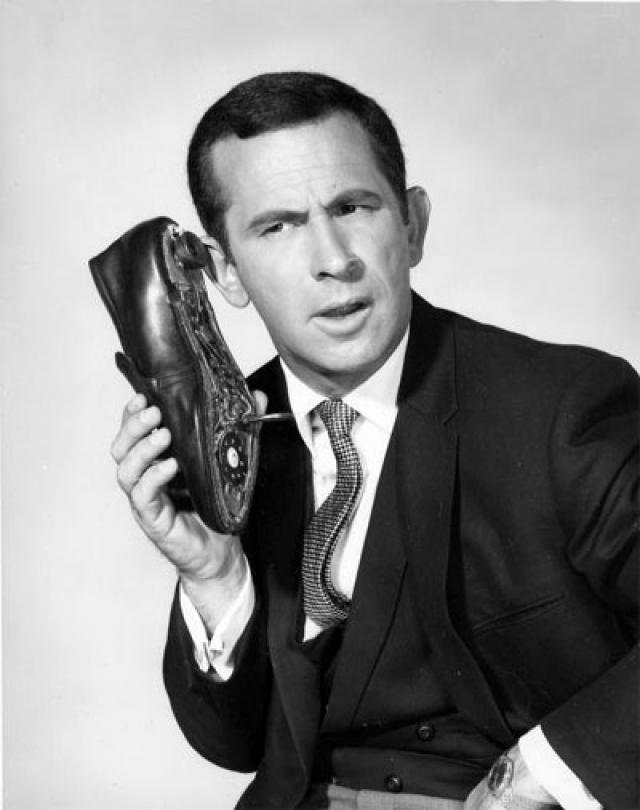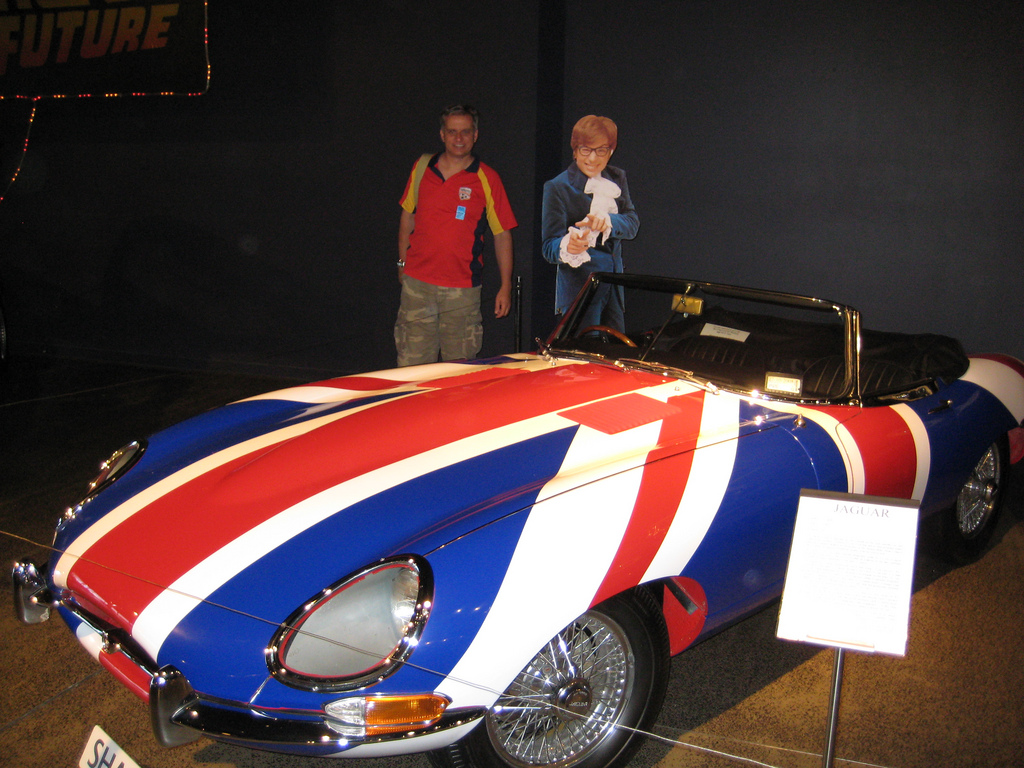|
Spy-fi (subgenre)
Spy-fi is a subgenre of spy fiction that includes elements of science fiction, and is often associated with the Cold War. Features of spy-fi include the effects of technology on the espionage trade and the technological gadgets used by the characters, even though the technologies and gadgets portrayed are well beyond current scientific reality. Definition and characteristics Spy-fi can be defined as media that centers around the adventures of a protagonist (or protagonists) working as a secret agent or a spy. Usually, these adventures will revolve around defeating a rival superpower or singular enemy from achieving a nefarious aim. Content may include themes such as world domination, world destruction, futuristic weapons, and gadgets. Settings vary from outright fantasy, such as outer space or under the sea, to real but exotic locations. Spy-fi does not necessarily present espionage as it is practiced in reality but rather glamorizes spy-craft through its focus on high-tech equip ... [...More Info...] [...Related Items...] OR: [Wikipedia] [Google] [Baidu] |
Subgenre
Genre () is any form or type of communication in any mode (written, spoken, digital, artistic, etc.) with socially-agreed-upon conventions developed over time. In popular usage, it normally describes a category of literature, music, or other forms of art or entertainment, whether written or spoken, audio or visual, based on some set of stylistic criteria, yet genres can be aesthetic, rhetorical, communicative, or functional. Genres form by conventions that change over time as cultures invent new genres and discontinue the use of old ones. Often, works fit into multiple genres by way of borrowing and recombining these conventions. Stand-alone texts, works, or pieces of communication may have individual styles, but genres are amalgams of these texts based on agreed-upon or socially inferred conventions. Some genres may have rigid, strictly adhered-to guidelines, while others may show great flexibility. Genre began as an absolute classification system for ancient Greek literature, a ... [...More Info...] [...Related Items...] OR: [Wikipedia] [Google] [Baidu] |
Sonic Weapon
Sonic and ultrasonic weapons (USW) are weapons of various types that use sound to injure or incapacitate an opponent. Some sonic weapons make a focused beam of sound or of ultrasound; others produce an area field of sound. military and police forces make some limited use of sonic weapons. Use and deployment Extremely high-power sound waves can disrupt or destroy the eardrums of a target and cause severe pain or disorientation. This is usually sufficient to incapacitate a person. Less powerful sound waves can cause humans to experience nausea or discomfort. The possibility of a device that produces frequency that causes vibration of the eyeballs—and therefore distortion of vision—was suggested by paranormal researcher Vic Tandy in the 1990s while attempting to demystify a "haunting" in his laboratory in Coventry. This "spook" was characterised by a feeling of unease and vague glimpses of a grey apparition. Some detective work implicated a newly-installed extractor f ... [...More Info...] [...Related Items...] OR: [Wikipedia] [Google] [Baidu] |
The Prisoner
''The Prisoner'' is a 1967 British television series about an unnamed British intelligence agent who is abducted and imprisoned in a mysterious coastal village, where his captors designate him as Number Six and try to find out why he abruptly resigned from his job. Patrick McGoohan played the lead role as Number Six. The series was created by McGoohan with possible contributions from George Markstein. Episode plots have elements of science fiction, allegory, and psychological drama, as well as spy fiction. It was produced by Everyman Films for distribution by Lew Grade's ITC Entertainment. A single series of 17 episodes was filmed between September 1966 and January 1968, with exterior location filming in Portmeirion, Wales. Interior scenes were filmed at MGM-British Studios in Borehamwood, north of London. The series was first broadcast in Canada beginning on 5 September 1967, in the UK on 29 September 1967, and in the US on 1 June 1968. Although the show was sold as a thri ... [...More Info...] [...Related Items...] OR: [Wikipedia] [Google] [Baidu] |
Get Smart
''Get Smart'' is an American comedy television series parodying the secret agent genre that had become widely popular in the first half of the 1960s, with the release of the ''James Bond'' films. It was created by Mel Brooks and Buck Henry, and had its television premiere on NBC on September 18, 1965. It stars Don Adams (who was also a director on the series) as agent Maxwell Smart (Agent 86), Barbara Feldon as Agent 99, and Edward Platt as The Chief. Henry said that they created the show at the request of Daniel Melnick to capitalize on James Bond and Inspector Clouseau, "the two biggest things in the entertainment world today". Brooks described it as "an insane combination of James Bond and Mel Brooks comedy". The show generated a number of popular catchphrases during its run, including "would you believe...", "missed it by ''that much''", "sorry about that, Chief", "...and ''loving'' it". The show was followed by the films ''The Nude Bomb'' (a 1980 theatrical film mad ... [...More Info...] [...Related Items...] OR: [Wikipedia] [Google] [Baidu] |
Danger Man
''Danger Man'' (retitled ''Secret Agent'' in the United States for the revived series, and ''Destination Danger'' and ''John Drake'' in other overseas markets) is a British television series that was broadcast between 1960 and 1962, and again between 1964 and 1968. The series featured Patrick McGoohan as secret agent John Drake (Danger Man), John Drake. Ralph Smart created the programme and wrote many of the scripts. ''Danger Man'' was financed by Lew Grade's ITC Entertainment. Series development The idea for ''Danger Man'' originated with Ralph Smart an associate of Lew Grade, head of ITC Entertainment. Grade was looking for formats that could be exported. Ian Fleming was brought in to collaborate on series development, but left before development was complete. Like James Bond, the main character is a globetrotting British spy (although one who works for NATO rather than MI6), who cleverly extricates himself from life-threatening situations and introduces himself as "Drake...J ... [...More Info...] [...Related Items...] OR: [Wikipedia] [Google] [Baidu] |
The Man From U
''The'' () is a grammatical article in English, denoting persons or things already mentioned, under discussion, implied or otherwise presumed familiar to listeners, readers, or speakers. It is the definite article in English. ''The'' is the most frequently used word in the English language; studies and analyses of texts have found it to account for seven percent of all printed English-language words. It is derived from gendered articles in Old English which combined in Middle English and now has a single form used with pronouns of any gender. The word can be used with both singular and plural nouns, and with a noun that starts with any letter. This is different from many other languages, which have different forms of the definite article for different genders or numbers. Pronunciation In most dialects, "the" is pronounced as (with the voiced dental fricative followed by a schwa) when followed by a consonant sound, and as (homophone of pronoun '' thee'') when followed by a ... [...More Info...] [...Related Items...] OR: [Wikipedia] [Google] [Baidu] |
The Avengers (TV Series)
''The Avengers'' is a British espionage television series, created in 1961, that ran for 161 episodes until 1969. It initially focused on David Keel (Ian Hendry), aided by John Steed ( Patrick Macnee). Hendry left after the first series; Steed then became the main character, partnered with a succession of assistants. His most famous assistants were intelligent, stylish and assertive women: Cathy Gale ( Honor Blackman), Emma Peel ( Diana Rigg), and Tara King ( Linda Thorson). Dresses and suits for the series were made by Pierre Cardin. The series ran from 1961 until 1969, screening as one-hour episodes for its entire run. The pilot episode, " Hot Snow", aired on 7 January 1961. The final episode, "Bizarre", aired on 21 April 1969 in the United States, and on 17 May 1969 in the United Kingdom. ''The Avengers'' was produced by ABC Weekend TV, a contractor within the ITV network. After a merger with Rediffusion London in July 1968, ABC Weekend became Thames Television, which ... [...More Info...] [...Related Items...] OR: [Wikipedia] [Google] [Baidu] |
Austin Powers (film Series)
''Austin Powers'' is a series of American spy action comedy films: '' Austin Powers: International Man of Mystery'' (1997), '' Austin Powers: The Spy Who Shagged Me'' (1999) and ''Austin Powers in Goldmember'' (2002). The films were produced and written by Mike Myers, who also starred as the title character and Dr. Evil. They were directed by Jay Roach and distributed by New Line Cinema. The franchise parodies numerous films and characters, including the ''James Bond'' series and '' Jason King'', and incorporates myriad other elements of popular culture as it follows a British spy's quest to bring his nemesis down. The character of Powers represents an archetype of 1960s Swinging London, with his advocacy of free love, his use of obscure impressions and his clothing style. The films poke fun at the outrageous plots, rampant sexual innuendo, and two dimensional stock characters associated with 1960s spy films. The general theme of the films is that the arch villain Dr ... [...More Info...] [...Related Items...] OR: [Wikipedia] [Google] [Baidu] |
Impossible (1966 TV Series)
Impossible, Imposible or Impossibles may refer to: Music * ''ImPossible'' (album), a 2016 album by Divinity Roxx * ''The Impossible'' (album) Groups * The Impossibles (American band), a 1990s indie-ska group from Austin, Texas * The Impossibles (Australian band), an Australian band * The Impossibles (Thai band), a 1970s Thai rock band Songs * "Impossible" (Captain Hollywood Project song) (1993) * "The Impossible" (song), a country music song by Joe Nichols (2002) * "Impossible" (Edyta song) (2003) * "Impossible" (Kanye West song) (2006) * "Impossible" (Daniel Merriweather song) (2009) * "Impossible" (Måns Zelmerlöw song) (2009) * "Impossible" (Anberlin song) (2010) * "Impossible" (Shontelle song) (2010) * "Impossible", from Rodgers and Hammerstein's 1957 musical ''Cinderella'' * "Impossible", a song written by Steve Allen and recorded by Nat King Cole for his 1958 album ''The Very Thought of You'' * "Impossible", from the 1994 album ''The Screaming Jets'' by The Sc ... [...More Info...] [...Related Items...] OR: [Wikipedia] [Google] [Baidu] |
James Bond In Film
James Bond is a fictional character created by British novelist Ian Fleming in 1953. A British secret agent working for MI6 under the codename 007, Bond has been portrayed on film in twenty-seven productions by actors Sean Connery, David Niven, George Lazenby, Roger Moore, Timothy Dalton, Pierce Brosnan, and Daniel Craig. Eon Productions, which now holds the adaptation rights to all of Fleming's Bond novels, made all but two films in the film series. In 1961, producers Albert R. Broccoli and Harry Saltzman purchased the filming rights to Fleming's novels. They founded Eon Productions and, with financial backing by United Artists, produced '' Dr. No'', directed by Terence Young and featuring Connery as Bond. Following its release in 1962, Broccoli and Saltzman created the holding company Danjaq to ensure future productions in the ''James Bond'' film series. The Eon series currently has twenty-five films, with the most recent, '' No Time to Die'', released in Sep ... [...More Info...] [...Related Items...] OR: [Wikipedia] [Google] [Baidu] |
In Like Flint
''In Like Flint'' is a 1967 American spy fi comedy film directed by Gordon Douglas, the sequel to the parody spy film ''Our Man Flint'' (1966). It posits an international feminist conspiracy to depose the ruling American patriarchy with a feminist matriarchy. To achieve and establish this plan, they kidnap and replace the U.S. President, discredit the head of the Z.O.W.I.E. intelligence agency, and commandeer a nuclear-armed space platform, all directed from ''Fabulous Face'', a women's beauty farm in the Virgin Islands. Circumstances compel ex-secret agent Derek Flint to help his ex-boss, and so uncover the conspiracy. James Coburn and Lee J. Cobb reprise their roles as Derek Flint and spy chief Lloyd C. Cramden, Flint's ex-boss, respectively. Jerry Goldsmith, who wrote the score for ''Our Man Flint'', also returns. The ad campaign features poster artwork by Bob Peak. The title is a play on the phrase "in like Flynn." This film and ''Caprice'' with Doris Day were the ... [...More Info...] [...Related Items...] OR: [Wikipedia] [Google] [Baidu] |





.png)


